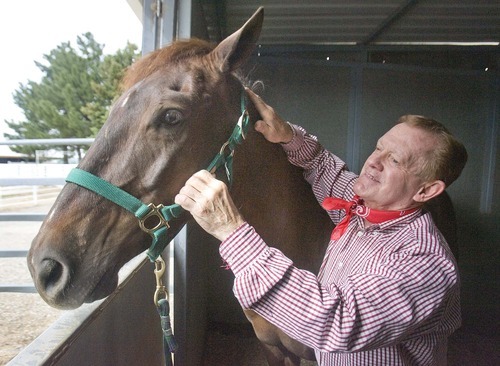This is an archived article that was published on sltrib.com in 2011, and information in the article may be outdated. It is provided only for personal research purposes and may not be reprinted.
A deadly horse virus outbreak that originated in Utah has prompted the cancellation of competitions across the United States in an attempt to contain the disease.
Late Wednesday, state veterinarian Bruce King said seven horses in Utah were infected with equine herpes virus-1, and eight horses were suspected of having the disease. Two horses were euthanized. The animals were boarded at four private facilities in Box Elder, Davis, Kane and Utah counties.
There are 33 confirmed infection cases in eight Western states. Seven horses have died.
All but one of the cases was traced to the National Cutting Horse Association's Western National Championships held in Ogden from April 29 to May 8, according to the U.S. Department of Agriculture.
The outbreak may not have run its course.
More than 300 horses from 18 states were exposed to the virus at the Ogden competition, and 689 horses were secondarily exposed. California reported the highest number of exposures with 54 confirmed cases, followed by 36 cases in Idaho and 30 in Colorado. Texas logged the highest number of potential exposures, with 323 horses, followed by 120 horses in Oregon and 68 in Colorado.
Although the disease cannot be transmitted to humans, it is extremely contagious among horses. The virus can cause mild, flulike illnesses in many cases, but some horses may become seriously or fatally ill with respiratory or neurologic disease.
King is confident that the virus did not originate on the grounds of the Golden Spike Event Center where the Ogden competition was held. His best guess is infected horses exhibiting no symptoms became stressed while traveling to the show, causing the outbreak.
Horses can become stressed during competitions, as well, said Fred Lowry, of Sandy, who has entered cutting horse shows for the past 40 years. "Horses are smarter than we give them credit for," he said. "They know why they're at the show. They know they have a job to do, and that's stressful."
Lowry entered two horses in the Ogden event. One was infected and has recovered. Although none of his six other horses is showing symptoms, he takes their temperatures twice daily and has quarantined his barn, as have others. Because the disease is so contagious, Lowry will not allow neighbors into his and he won't go into theirs.
Quarantines last at least 28 days.
Steve Williams also competed in Ogden, but rather than boarding his horses there, he returned to his Grantsville ranch at the end of each day's events. Although none of his horses has symptoms, as a precaution he monitors them daily and doesn't allow anyone to use his arena.
In still another precaution, the 22,000-member National Cutting Horse Association has canceled all competitions for the time being, affecting as many as 20 nationwide events. Other shows in Utah and elsewhere have either been postponed or canceled. Officials are telling owners to call before leaving for an event to make sure the competition hasn't been rescheduled.
"Right now, the less interaction with horses, the better off we are," said Dennie Dune, of Salt Lake City, and the group's past president. "We not only have to protect our own horses, we also have a responsibility to other equine disciplines sharing the same municipal facilities in other competitions."
Competitions are big business. Owners say the price for a cutting horse can range from $30,000 up to more than $1 million. The American Horse Council says horse shows are a $39 billion annual industry.
King said the only way to stop outbreaks is to vaccinate horses, but inoculations don't protect against all forms of the disease.
Horses that attended the Ogden event or have been in contact with horses that entered the event should be isolated and have their temperatures recorded twice a day. And if there's any increase in body temperature or symptoms, King said, a veterinarian should be contacted.
Jerry Black, director of Undergraduate Programs in Colorado State University's Equine Sciences Program, said he's been surprised at the low number of confirmed cases from the Ogden show, compared with how aggressive the virus appeared to be.
"The industry has been so adamant about closing down shows and recommending horse owners to stay home at this point, so we're cautiously optimistic," he said.
Twitter:@DawnHouseTrib —
Equine herpes virus
The virus is not transmittable to people, but can be a serious disease in horses that can cause respiratory, neurologic disease and even death.
The most common way for the virus to spread is by direct horse-to-horse contact.
The disease also can spread through the air, contaminated equipment, clothing and hands.
Owners should watch their horses carefully and call a veterinarian if any abnormal signs are observed.
Symptoms include fever, decreased coordination, nasal discharge, urine dribbling, loss of tail tone, hind-limb weakness, leaning against a wall or fence to maintain balance, lethargy and the inability to rise.
Source: Utah Department of Agriculture and Food.



